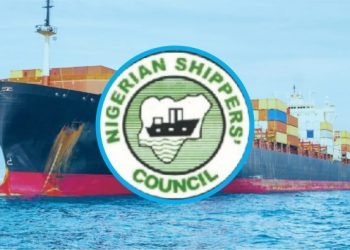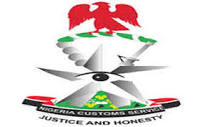Nigeria govt cripples economy of Benin Republic, others
By Uzor Odikpo
Lagos
Stakeholders in the maritime sector have expressed concern that the latest ban on importation of vehicles through land borders is a tactical...
Customs hits N1.2b monthly revenue in Seme
The Seme Command of the Nigeria Customs Service (NCS) has collected the sum of one billion, two hundred and forty-seven million, one hundred and...
NJIC concedes to maintain current wages
The National Joint Industrial Council (NJIC) has succumbed to discontinue further negotiations for the increment of wages of dock workers given the prevailing economic...
Entrepreneurship, key to economic growth – NPA
The management of the Nigerian Ports Authority (NPA) has taken steps that will promote the activities of small and medium-scale entrepreneurs and foreign investors...
Buhari bans importation of vehicles via borders
.Stakeholders react
The Federal Government on Monday announced banned the importation of vehicles into the country through the land borders.
The National Public Relations Officer of...
NDLEA impounds N2b cocaine
Customs seizes undeclared Chinese cigarettes
A substance concealed in a container allegedly belonging to Nigerite, recently intercepted at Tin Can Island Port, is 214,732 kilograms...
FG approves new maritime security architecture
Ameachi touts improvement under his watch
By Uzor Odigbo
Special Correspondent, Lagos
Transportation Minister, Rotimi Amaechi, says maritime security has improved under his watch from 9...
NIMASA moves to recover $5b debt
By Uzor Odigbo
Special Correspondent, Lagos
Nigerian Maritime Administration and Safety Agency (NIMASA) has stepped up efforts to recover $5 billion debt with the appointment of a debt recovery agent.
NIMASA Head of Corporate Communications, Lami Tumaka, said Snecou Financial Services Company will help recover debts owed for two years in addition to revenue collection.
Snecou’s contract went through the due process of Parastatals Tenders Board (PTB) and is for a first instance of two years which will be subject to renewal.
“Given the urgent need to recover the agency’s debts which are in billions of naira, the agency sought and obtained approval for a ‘Certificate of No Objection’ from the Bureau of Public Procurement in line with the Public Procurement Act (PPA),” Tumaka added.
The contract is based on a success rate of 13 per cent using a benchmark of $19,753,012.36 and N239,607,155.52 monthly revenue while a maximum cap of 15 per cent success rate is payable on any new revenue head discovered by the consultants within the contract period.
Snecou Financial Services Company will be paid 13 per cent of only the revenue above the threshold of the approved benchmark in the course of the contracting period.
It will also be entitled to a maximum of 15 per cent of new revenue streams discovered during the period.
Tumaka explained that this is in line with the vision of NIMASA Director General, Dakuku Peterside, which is in accordance with the agency’s Medium Term Strategic Growth Plan, part of which is to enhance its revenue.
Peterside denied reports that the contract was awarded to Rivers State All Progressives Congress (APC) chairman, saying this is different from what NIMASA had with Global West Vessels in the past.
“We have awarded a debt recovery contract which is totally different from what Global West was doing for NIMASA. The contract was not awarded to the chairman of the APC in Rivers State.
“It was awarded to Snecou Nigeria Limited and we advertised the contract in several newspapers. So I don’t see what is wrong with awarding a contract to get our money from debtors,” he said.
Peterside disclosed that NIMASA is owed between $4 billion and $5 billion, which has necessitated an urgent need to recover it to develop infrastructure for the maritime industry.
“Debts owed NIMASA by various operators in the maritime industry had grown exponentially over the last five years even necessitating an investigation and convocation of a Public Hearing by the House of Representatives Committee on Maritime Safety, Education and Administration in June this year.
“This contract is expected to recover these debts and channel the funds into developing critical infrastructure as well as knowledgeable manpower for the industry.”
‘Maritime won’t generate revenue without production’
By Chukwudi Nweje
Assistant Editor
Maritime will become an alternative revenue earner only if the productive sectors are developed, says former Managing Director of the Nigerian Shippers Council and President of the Union of African Shippers Council (UASC), Kingsley Usoh.
He disagreed with the argument that the sector can generate more revenue in the face of dwindling oil receipts without production.
“Transport in general is a carrying trade. The economy has to produce before you start transporting. Those talking about maritime serving as an alternative revenue earner to crude oil are just joining the bandwagon.
“Maritime will help if those things that need transportation are developed,” he explained.
Usoh – who holds a master’s degree in transportation engineering and operations from the University of Newcastle and a doctorate in maritime transport technology and administration from Federal University of Technology (FUTO), Owerri – blamed the colonial structure which farmed Nigeria for cash crops processed in factories in Europe.
“They planted the crops here to get the products, harvested here and then shipped the crops to Europe for the factories to work on them and the factories would employ their own people.
“The people they employed would help raise Gross Domestic Product (GDP) of their own country. The colonial masters only used Nigeria as a feeder service.
“Maritime will only yield revenue if there is industrialisation. The people who talk about maritime yielding revenue do not consider these things. Unless Nigeria industrialises, we will only feed their factories and will continue to have unemployment.”
He urged the federal government to reposition the universities to adapt home grown technologies to produce semi-manufactured goods “from the nation’s mineral resources and from the harvests we have.
“If we follow the argument to continue to produce and produce, it will not help us. Go to the markets and see how much of tomatoes we waste.
“We do not even have enough storage facilities to store our excess produce. What we waste in Nigeria can feed the country for two years.”
Usoh also decried the rot in the maritime sector blaming it on people from all sorts of backgrounds who parade themselves as clearing and forwarding agents.
He described clearing and forwarding as a skilled discipline that requires proper training before the practitioners venture into it.
He has published several books, including The Politics of Shipping and the Nigerian Economy (1994) and Freight Charges in West Central African Liner Conference Trade (2004), in which he discussed problems in the maritime sector and how to solve them.
Group seeks full utilisation of Calabar, Port Harcourt ports
South South Consolidated Forum (SSCF) has demanded the full use of Calabar and Port Harcourt seaports, as well as Tinapa business resort in Calabar,...

















